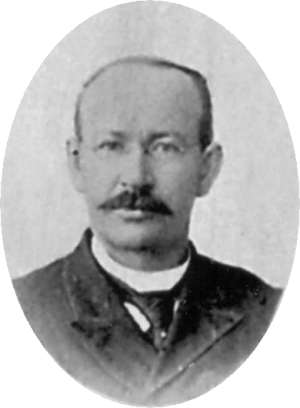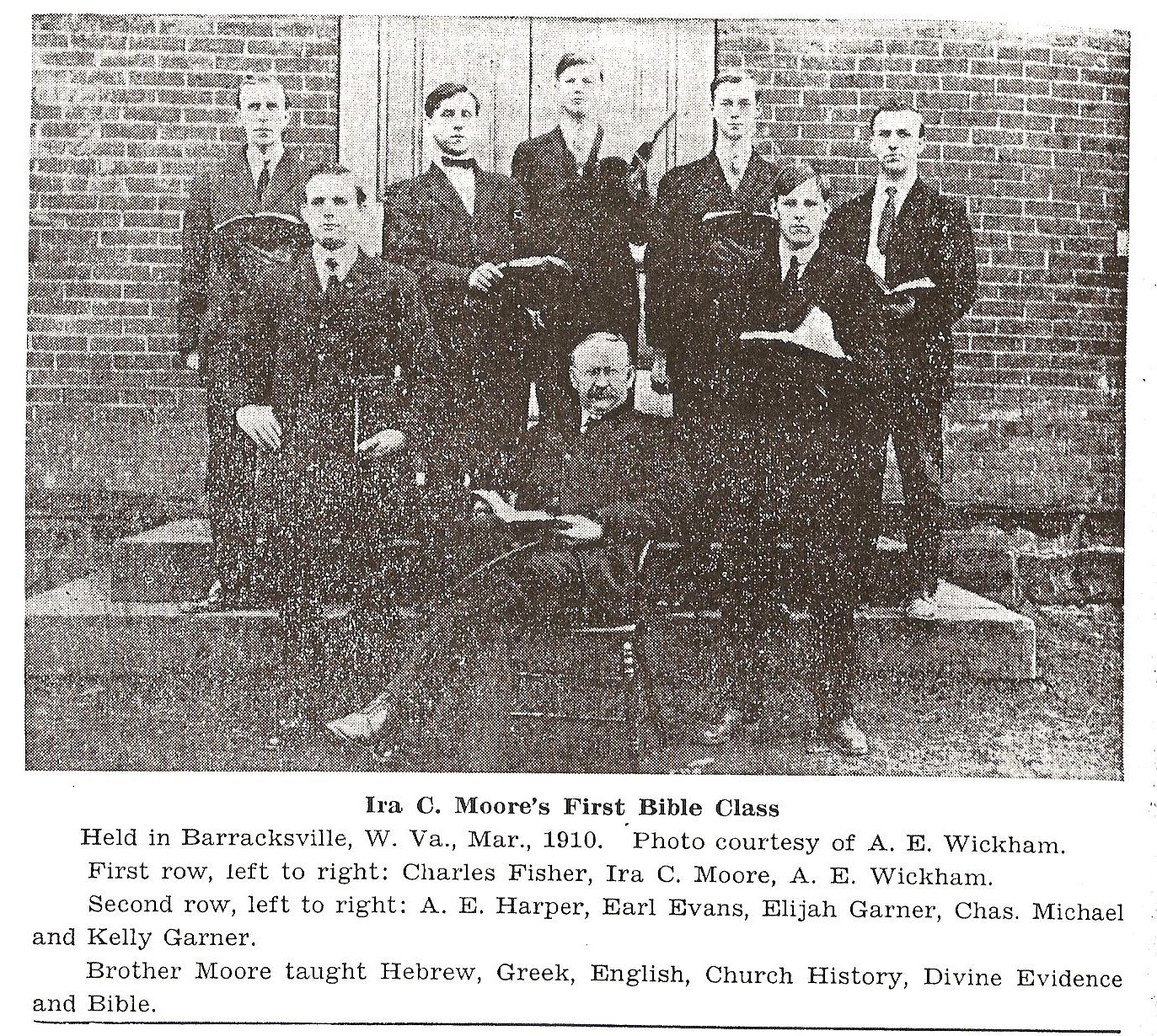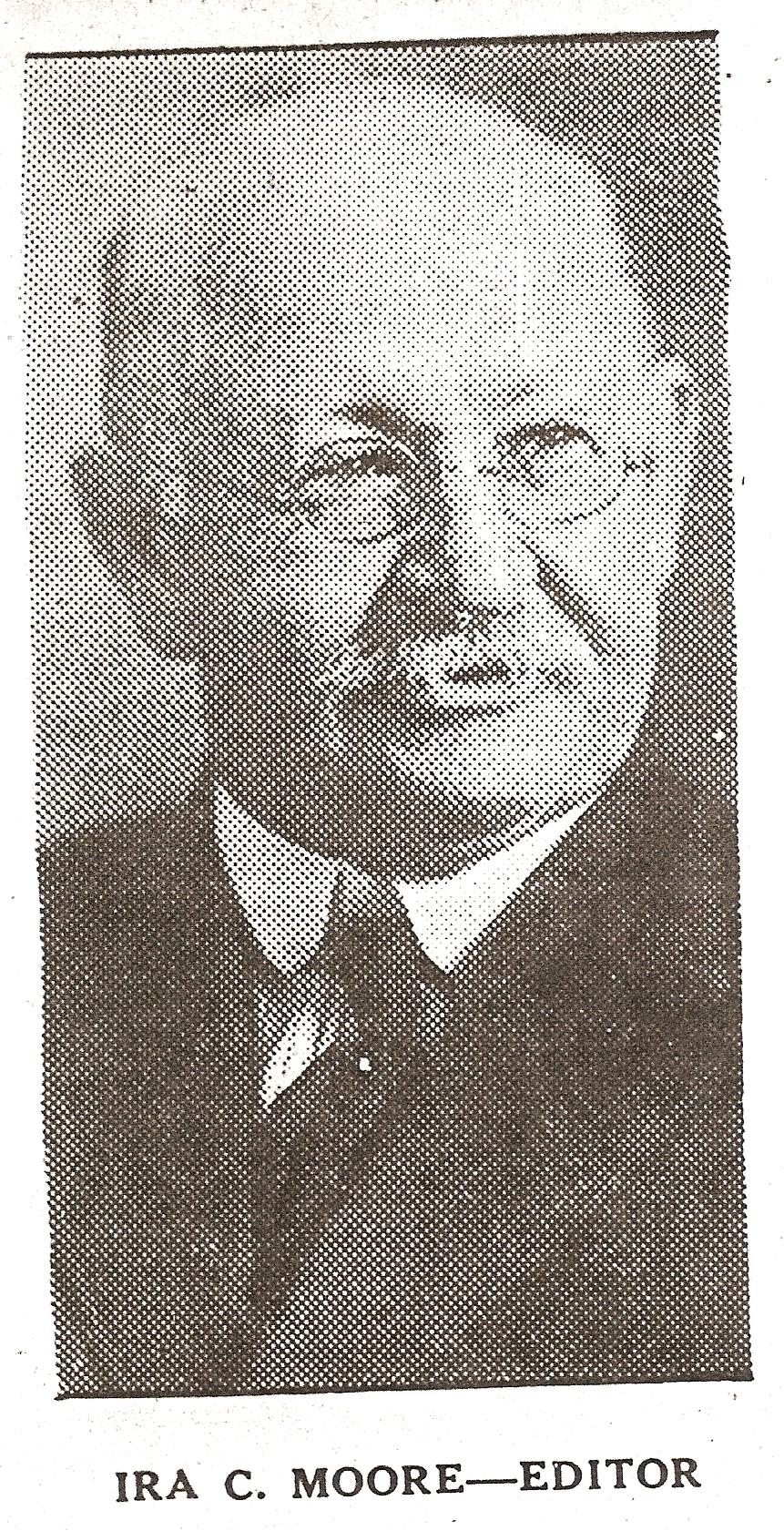Ira C. Moore
by Bruce Daugherty
West Virginia native Ira Corwin Moore served as senior editor of the Christian Leader from 1925 to his death in February 1938. He had been an associate editor with the paper since 1910.

Ira C. Moore was born in Tyler county, West Virginia on February 27, 1860. He was raised in a home that had long cherished the appeal for primitive Christianity as his paternal grandmother was a sister to Uncle David White, a pioneer preacher. This religious heritage included exposure to gospel papers like the Millenial Harbinger and The American Christian Review and a scattering of religious books, among which were the two volumes of Franklin’s sermons. The Shriver Moore family worshiped with the brethren meeting in Little Buffalo, which was about four and half miles from their farm. Moore later shared a fond remembrance of this congregation: “This is the place . . . where I publicly, before a large audience, confessed my faith in Jesus and was baptized into Him; the place where I made my first and staggering efforts at public prayer and exhortation. (Moore, 1915, 13). Moore was one of about thirty-five who obeyed the gospel in a meeting held by R. H. Singer in February 1880. (Moore, 1926, 4).
As a young man, Moore proved to be an apt student and went on to receive a “Normal Certificate” after he had finished his regular schooling. At the age of 19 he began teaching in Tyler county and also held a job with a nearby sawmill. If J. W. Shepherd was the scholar of the Christian Leader, Ira Moore was its teacher. Throughout his subsequent ministerial and editorial endeavors, he always saw himself as a teacher.
Moore married Amanda Jane Sandy “Aunt Manda” in April 1883. They lived in Hebron, West Virginia. While in Hebron, three children blessed their household: Ida, Lloyd, and James. In 1889 Moore briefly gave up school teaching to become the postmaster for Middlebourne, West Virginia. In addition, Ira gained journalistic experience, serving briefly as editor of the Tyler County Star, a newspaper co-owned with a brother. In the spring of 1891 Moore sold his interest in the paper and moved to New Martinsville, West Virginia to begin teaching again. It was in 1891 that Ira Moore began going to nearby congregations to preach on Saturday evenings and Sundays. After the end of the school term in 1892, he began preaching full time.
In the spring of 1893 Moore moved his family to Barrackville, West Virginia where he located with the congregation meeting there. An oft repeated story is told that when Moore arrived in Barrackville, the sign over the door to the meeting house said “Christian Church.” His first act was to remove the sign and replace it with one reading “Church of Christ.” Moore was located in Barrackville till 1917, though he would be engaged in evangelistic and debate work throughout West Virginia, Ohio and Pennsylvania. On a few occasions he made preaching tours to the West, going as far as Missouri, Kansas, and Oklahoma and as far South as Tennessee.(Hutson, 5).
Ira Moore’s religious journalistic work began with the Apostolic Review of Daniel Sommer. But Moore found himself “ruled out of the Review.” Among other things, he fell out of favor with Sommer when he did not take Sommer’s position regarding Bible colleges. This was an especially sore point with Moore who, because of his teaching background, believed an organized, systematic program of Bible instruction was needed in many churches. Moore believed that Christians were at liberty to support or not support a school in which the Bible was taught and that it should not be made a test of fellowship.(Moore, 1914, 9). Moore considered the Bible college in the same category as religious papers - a private enterprise. Rejected from the Review, Moore turned to the Leader, whose policy was favorable toward the Christian colleges. Moore also served as an associate editor for W. J. Rice’s Gospel Echo and The Gospel Missionary.(Moore, 1918, 9).
Part of Moore’s ministry in Barackville was the formation of evening Bible study classes for young men and women. Moore was especially appreciative of the young men who came to his sessions and then would soon go out preaching. He had little paticne with those who condemned his “Bible school method” by trying to equate it to an unscriptural institution. “One of the unfair, and in some cases, disreputable things that are resorted to in the needless and harmful controversy that has arisen over how the elders shall or should proceed to do their teaching and training of the youth of the community, is the prejudicial practice of the would be instructors on methods of teaching, of calling every manner of procedure “the Sunday school,” except the speech-making plan of the elders or those preachers who have never themselves been in school long enough to learn not to say, “for you and I,” saying nothing of having experience enough as teachers to be able to instruct others in the best methods of teaching.” (Moore, 1929, 4).

Moore described the typical fashion of study as a “pouring in” process that was well suited for students who had “memories like a tar bucket - so that everything that touches them will stick to them.” He believed that such instructors usually had little to “pour in,” and “scattered so much” that the student received very little instruction. Such instructors were especially unequipped to train others to teach. “Instruction on how to teach, coming from some people (preachers), is about as consistent as instructions coming from an old maid on how to raise children; or a recommendation of a hair restorative from a bald-headed proprietor thereof.” (Ibid.)
In contrast, Moore called his method a “drawing out” process. He had developed an extensive series of searching questions over the Gospels, usually studied together in a chronological order. He had also developed the same for the book of Acts and a number of the New Testament epistles. (Moore, 1932, 4). The questions were designed with an entire Bible in hand, not just a New Testament. This allowed the student to see “how the two Testaments are interlocked.” As an example, Moore spoke of a lesson on the third or fourth chapter of Galatians. “No one can make a profitable study of Galatians and not have access to the Old Testament back as far as Genesis twelfth chapter.” (Ibid). Though preachers preferred the “sermonic, lecture, pulpit method,” Moore said that they did not get their knowledge of the Bible in that manner. Their knowledge of the Bible came “by coming in actual contact with it and reading and studying its utterances.” With this type of teaching program, Moore instructed the churches he worked with and developed many young preachers.
In 1916 Moore spoke of a mission work needed in his home state: “There are a few brethren of the loyal type living in and about Charleston, the capital of West Virginia, and while there is a little, struggling, dwarfed congregation out about one mile from the State House, there is no congregation of the primitive type in the city.” (Moore, 1916,8). Beginning from tent meetings assisted by his brother Dora, Moore’s primary preaching efforts for the rest of his life were poured into building up the cause of Christ in Charleston. The work in Charleston was supported by other congregations and individuals but the Moores never lived on more than $50 a month.(Moore, 1932, 4). There was one advantage in moving to Charleston. It was closer to Cincinnati, enabling better communication with Fred Rowe at the Leader office. Moore and Rowe exchanged an average of four letters a week each way between publisher and editor.

Ira Moore died of a heart attack February 18, 1938 in his home in Charleston. He had taught his Bible class on Thursday night and was making preparations for the session on Friday evening. School was out, teacher had gone home. (Lucas, 8).
Works Cited
Hutson, Thad. "Ira C. Moore" Christian Leader 52 (Mar. 1, 1938):5.
Lucas, H. F. "School is Out" Christian Leader 52 (Apr. 26, 1938): 8.
Moore, Charles. "Short Biography of Ira C. Moore" West Virginia Christian (July 2003):5.
Moore, Ira C. "In Memory of Father" Christian Leader 29 (Dec. 14, 1915):8-9.
__________. "Editorial Views and Reviews" Christian Leader 40 (Nov. 9, 1926):4.
__________. "Editorial Brevities" Christian Leader 28 (Mar, 31, 1914):9.
__________. "Bro. W. J. Rice is Dead" Christian Leader 32 (Feb. 5, 1918):9.
__________. "Editorial Views and Reviews" Christian Leader 43 (Apr. 9, 1929):4.
__________. "A Sample Lesson to be Given" Christian Leader 46 (Jun. 14, 1932):4.
__________. "Editorial Brevities and Comments" Christian Leader 30 (Jun. 6, 1916):8.
__________. "To Those Who Have Appealed to Us for Help" Christian Leader 46 (Jan. 12, 1932):4.
Rowe, Fred. "Biographical Sketch of Ira C. Moore" Christian Leader 52 (Mar. 1, 1938):4.
